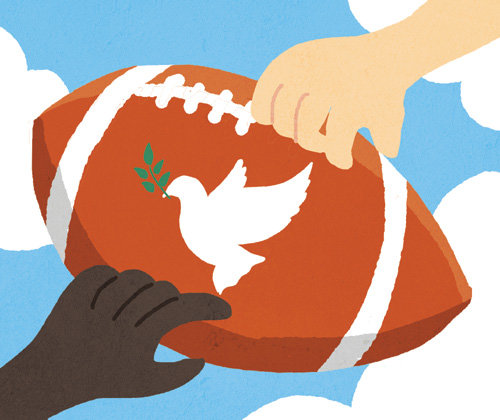South Africa claims the championship at 2019 Rugby World Cup
South Africa claims the championship at 2019 Rugby World Cup
Posted November. 06, 2019 07:17,
Updated November. 06, 2019 07:17

The 2019 Rugby World Cup had been held over the last few weeks garnering global attention despite the lack of interest in South Korea. South Africa emerged as the champion of this year from the final round against the U.K. on Saturday. Coincidentally, South Africa won the championship every 12 years with its wins in 1995, 2007, and 2019. Some blessings accompanied the team this year as if to celebrate the country overcoming a long period of apartheid.
Siya Kolisi, the captain of the South African national team, said right after the win that the team’s goal was to unite all people in the country. In fact, all South Africans – regardless of the color of their skin – have become united through this year’s World Cup thanks to the efforts made by Kolisi – the very first black captain of the team – as well as his team members. However, he still has remained humble as always.
Having a black player leading the team was unimaginable in the past. Rugby used to be mainly played by white people in South Africa, which led to black people putting distance between themselves and the sport that represented racism. This was also why Nelson Mandela who was elected as the president in 1994 was pressured to change the name of the country’s national rugby team “Springboks.” However, he chose to maintain the original name and provide plenty of support to the team, which was mostly composed of white players. Regardless of past history, white citizens who were the fans of the sport were also the citizens that Mandela had to embrace. The anti-apartheid president approached sports as means of reconciliation, rather than games with clear winners and losers. He forgave white people who imprisoned him for 27 years.
The fact that Rassie Erasmus, the white coach of the South African team, appointed Kolisi as the captain was also in line with the reconciliatory approach adopted by Mandela. The national team led by a white coach and a black captain has symbolically healed the wounds of apartheid by winning the World Cup and successfully united 57 million South Africans who are suffering from skyrocketing unemployment rates, crimes, conflicts, and hostility. It is a clear case showing the magnificent healing power of sports.
tjdrud0306@donga.com
Headline News
- N. Korea launches cyberattacks on S. Korea's defense companies
- Major university hospital professors consider a day off each week
- Italy suffers from fiscal deficits from ‘Super Bonus’ scheme
- Inter Milan secures 20th Serie A title, surpassing AC Milan
- Ruling and opposition prioritize spending amid tax revenue shortfalls






